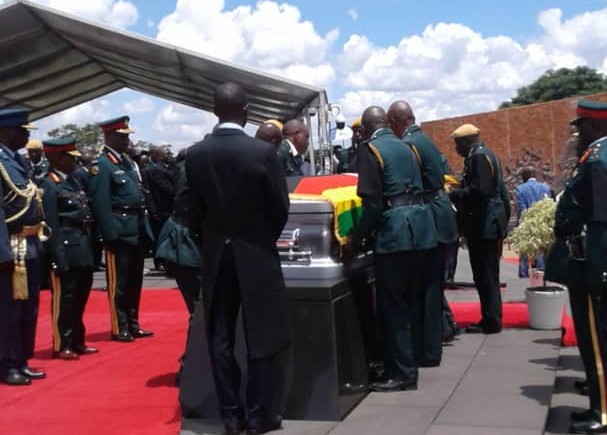Staff Reporter
In a poignant eulogy for the late Professor Ngwabi Bhebhe, a distinguished academic figure and former Vice Chancellor of Midlands State University, President Emmerson Mnangagwa delivered a powerful message that resonated deeply with the nation, particularly its youth.
Speaking at the National Heroes Acre yesterday during Professor Bhebhe's burial, the President emphasised the importance of embracing Zimbabwean and African identity, urging the youth to take pride in their heritage and leverage their intellectual capabilities for the country's advancement.
President Mnangagwa's speech was not only a tribute to a revered academic but also a call to action for the younger generation.
The President underscored the critical role of embracing one's cultural roots in national development.
“Our people, especially the youth, to always take pride in being Zimbabwean and African, no matter how educated they are,” he passionately stated.
Furthermore, President Mnangagwa highlighted the need for the youth to use their academic and intellectual skills to foster Zimbabwe’s progress.
“Our intellectual and academic prowess must be deployed to advance our national development agenda and to lift our people out of poverty,” he remarked.
Drawing inspiration from Professor Bhebhe's legacy, President Mnangagwa emphasised the significance of owning and understanding the nation's narrative. He eloquently expressed this in the local vernacular: "Nyika inovakwa, inotongwa, inonamatigwa nevene vayo, ilizwe lakhiwa, libuswe, likhulekelwe ngabanikazi bayo."
This translates to the conviction that the citizens are the true architects, governors, and guardians of their land.
The President urged Zimbabweans to actively participate in defining their national narratives, encompassing the past, present, and future.
President Mnangagwa also called on the academic community to take a central role in shaping these narratives, ensuring the nation's history and aspirations are accurately portrayed and comprehended.
"In this regard, academia is challenged to rise to the occasion," he asserted, acknowledging the influential role of scholars and intellectuals in crafting the nation’s trajectory.
As Zimbabwe strides towards Vision 2030, President Mnangagwa stressed the value of history and literature as key elements in guiding the country’s path.
"The understanding of our rich history and the literal works articulating our chosen development trajectory remain a material force,” he noted.
Meanwhile,President Mnangagwa’s address at the burial of Professor Bhebhe was more than a commemoration of a great academic's life; it was a profound reminder of the importance of cultural identity, intellectual contribution, and historical understanding in the pursuit of national progress and unity.
His words served as a beacon, guiding the youth and academics of Zimbabwe towards a future where pride in heritage and intellectual prowess are key drivers of socio-economic transformation.




